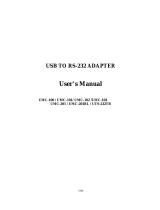
Copyright © 2009 Future Technology Devices International Limited 11
Document Reference No.: FT_000201
FTDI Drivers Installation guide for MAC OSX
Application Note AN_134 Version 1.0
Clearance No.: FTDI# 123
6 D2XX Troubleshooting
6.1 I can't open a port even though the installation has been
Successful
This is possibly due to the FTDI serial driver holding the port with your VID and PID.
Solution is to uninstall the serial driver . To completely eradicate the possibility of this occurring in future,
it is recommended a new VID and PID is used to distinguish between devices.
Another possibility is an incorrect VID/PID. Try changing your application to use the FT_SetVIDPID API
call to quickly determine if this is the case.
6.2 After running an application two or three times, communication
stops
It is always recommended that you close a file handle obtained by FT_Open/FT_OpenEx before
exiting an application. Side effects of not closing the handle with the multithreaded setting (as
illustrated above) can be future communication with the device fails (always test this prior to
enabling this setting).
The Sample applications demonstrate a method of trapping an abnormal exit (control C operation) and
closing each handle in turn.
If you cannot find a work around then try setting the USB Reset After Open bit in the ftd2xx.cfg file but
only as a last resort.
6.3 Problems upgrading to the latest D2XX driver
Upgrading the D2XX library can cause problems, such as a reported bug fix does not appear to be
fixed. This is most likely related to the application executable pointing to a previous version of the
library.
To determine which D2XX library your application is using perform the following steps (examples in
brackets assume you have copied all of the files to the desktop and successfully compiled the samples as
described in the Samples section):
Open a Terminal window (Go > Applications > Utilities > Terminal).
Change directory to the application executable folder (cd Desktop/D2XX/Samples/Simple)
Use otool to determine the library path (otool -L simple).
The following text is an example of what is displayed
simple:
/usr/local/lib/libftd2xx.0.1.7.dylib (compatibility version 0.1.7, current version 0.1.7)
/usr/lib/libSystem.B.dylib (compatibility version 1.0.0, current version 88.1.6)
As illustrated the, simple application is pointing to libftd2xx.0.1.7.dylib.
To alter the library so that the simple sample points to use the install_name_tool (e.g
install_name_tool -change /usr/local/lib/libftd2xx.0.1.7.dylib /usr/local/lib/libftd2xx.dylib simple).
Please note you may need to change user mode to perform this function depending on the file
permissions set on the executable.
Run the otool (illustrated in step 3 above) to confirm that the library pointed to by the application
has changed and is correct.




















